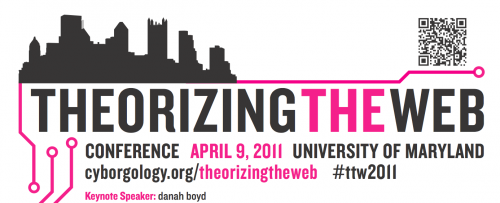Theorizing the Web 2011 was a wicked conference. It was also a bit of a meta-experience in augmented reality.
Maybe not textbook augmented reality, admittedly, since – as happens at geek conferences – the sheer multitude of smart phones and laptops present overpowered the wireless system and the majority of us couldn’t get online much. I was disappointed that I couldn’t tweet a few of the presentations: one of the joys of digital participation is in turning a monologue into a forum, a conversation of sorts.
But there was plenty going on, even without much digital augmentation. Put together by PJ Rey & Nathan Jurgenson, grad students who set out to run the conference they wanted to go to, TtW2011 appeared to succeed beyond their wildest dreams. The day was jam-packed with sessions on new economies and cyber-racism and cyber-support and structure/agency and the question of social media revolutions, among others. The panels hung together, mostly, and people put work & energy into their presentations. Even the final sessions, which ran through what my parent-of-preschoolers brain has come to consider “suppertime,” played to engaged audiences.
That wasn’t the augmented reality part, though. Rather, the whole trip was. I marked my five-year blogging anniversary on Monday. And the trip to DC and College Park offered what for me – as the sole practicioner of social media in an Education cohort of three on an island half-way off the side of Canada – was a heady face-to-face tour through almost all corners of the connections I’ve made and learning I’ve done over that five years. I roomed with digiwonk, and sat in as she presented the results of a mommyblogging survey I participated in almost three years ago. I got to spend the day with Neilochka, who – as promised – didn’t call bullshit on me once. (At least not so I could hear him.) I listened to danah boyd’s keynote and complimented her on her boots, after citing her extensively in one of my term papers last fall. After all these years, I spent a glorious splashy rainy afternoon with Susan before the conference formally began. Through my panel I met fellow explorers into this messy, chewy business of cyborgs and mediated lives. I even met the real-life friend & colleague of someone I spent last week debating on Twitter. Tiny world. My apparently tiny digital world, all its interconnections brought to life in one short weekend.
The conference was the augmentation, for me, the extra. Back now in my pastoral cloister on the edge of the planet, this digital sphere is the one in which I seek the majority of my daily engagement with people over the age of five. Having them come to life in front of me reminded me of nothing so much as my first foray into Second Life, except without the difficulty walking and flying. TtW2011, for me, was proof not only that augmented reality really does exist, Virginia, but that there is no hierarchy of modes within it. All is interconnected, rhizomatically interwoven, ever-shifting and ever-surprising and ever-rich.
***
As for my presentation, I am still working on the art of clarity. I managed to pack a theoretically complex, 20 page paper into 15 minutes. Sorta. Here, in the slideshare below, I manage it in 10ish. I wish it were 5.
I’ve always been a literary storyteller…if I can teach myself through practice to become an effective didactic one, then I’ll be able to become the presenter I want to be. But there will be a lot of practice – a lot of reining in my natural tendency to go on and on, musingly – between now and then. Feedback welcome, and share at will.
